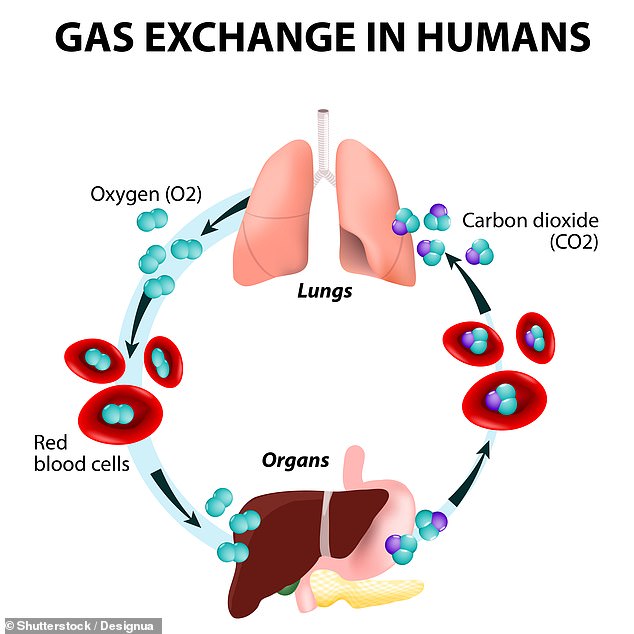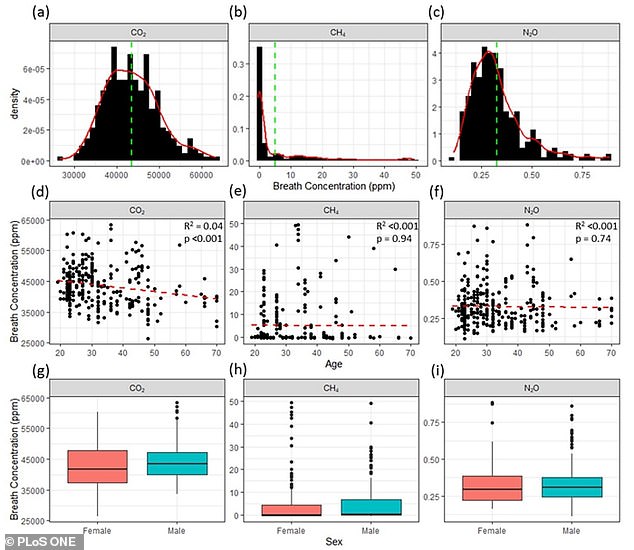Now scientists say BREATHING is bad for the environment: Gases we exhale contribute to 0.1% of the UK’s greenhouse gas emissions
Whether it's eating less meat or cycling instead of driving, humans can do many things to help prevent climate change.
Unfortunately, breathing less isn't one of them.
That could be a problem, as a new study claims that gases in the air exhaled from human lungs are fueling global warming.
Scientists say the methane and nitrous oxide in the air we exhale account for up to 0.1 per cent of the UK's greenhouse gas emissions.
This doesn't even include the gas we release from burping and farting, or the emissions that come from our skin without us noticing.
Whether it's eating less meat or cycling instead of driving, humans can do many things to help prevent climate change. Unfortunately, breathing less isn't one of them (stock image)
The new study was led by Dr Nicholas Cowan, an atmospheric physicist at the UK Center for Environment and Hydrology in Edinburgh.
“Human exhaled breath can contain small, elevated concentrations of methane (CH4) and nitrous oxide (N2O), both of which contribute to global warming,” say Dr. Cowan and colleagues.
“We would urge caution in assuming that emissions from humans are negligible.”
As most of us remember from science lessons in school, humans breathe in oxygen and exhale carbon dioxide.
When we inhale, air enters the lungs, oxygen from this air moves into the blood, while carbon dioxide (CO2), a waste gas, moves from the blood to the lungs and is exhaled.
As for plants, it is the opposite; Plants use carbon dioxide to produce oxygen as a byproduct (the process known as photosynthesis).
Everyone exhales carbon dioxide, but in their new study, the researchers focused on methane and nitrous oxide.
These two gases are powerful greenhouse gases, but because they are released in much smaller quantities, their contribution to global warming may be overlooked.

When we inhale, air enters the lungs, oxygen from this air moves into the blood, while carbon dioxide, a waste gas, moves from the blood to the lungs and is excreted
What's more, plants absorb essentially all the carbon dioxide emitted in human breathing, so the contribution of human breathing carbon dioxide to climate change is essentially zero, Dr Cowan told MailOnline.
The same cannot be said for methane and nitrous oxide, as plants do not use these gases in photosynthesis.
For the study, researchers studied methane and nitrous oxide emissions in human breath from 104 UK adult volunteers.
Participants were asked to take a deep breath, hold it for five seconds, and then exhale into a resealable plastic bag.
A total of 328 breath samples were collected, and each participant recorded details such as age, gender, and food preferences.
After analyzing the samples, the researchers found that nitrous oxide was emitted by every participant, but methane was found in the breaths of only 31% of participants.
Those who don't exhale methane on their breath are more likely to “fart” — in other words, by farting, the researchers say.
Interestingly, people with methane in their exhaled breath were more likely to be female and over the age of 30, but researchers aren't sure why.
The concentration of the two gases in the total samples allows researchers to estimate what proportion of the UK's emissions are from our breath – 0.05 per cent for methane and 0.1 per cent for nitrous oxide.
Dr Cowan stresses that each of these ratios relates specifically to these gases in question, and not to all greenhouse gas emissions in the UK as a whole.
The researchers were unable to find any link between gases in the breath and diet – although meat eaters are known to be fueling the climate crisis in other ways.
Experts stress that their study only looked at greenhouse gases via breathing, and therefore does not provide a comprehensive estimate of a person's emissions footprint.

In the experiments, all participants exhaled carbon dioxide (left). Nitrous oxide (right) was also emitted by every participant, but methane (center) was found in the breaths of only 31 percent of participants.
According to the authors, methane and nitrous oxide emissions are “generally ignored in most environmental monitoring” because they are considered negligible.
However, further study of human emissions of these gases — not just from our breath — could reveal more about “the effects of aging populations and changing diets,” the team says.
Inside the human body, methane is produced by microorganisms called methanogens, which colonize our digestive tract.
Methane crosses into the blood and travels to the lungs where it can be exhaled.
Meanwhile, bacteria in the intestines and oral cavity convert nitrates in food and water into nitrous oxide, which also escapes in people's breath.
The study was published in the journal One plus.
(tags for translation)dailymail
